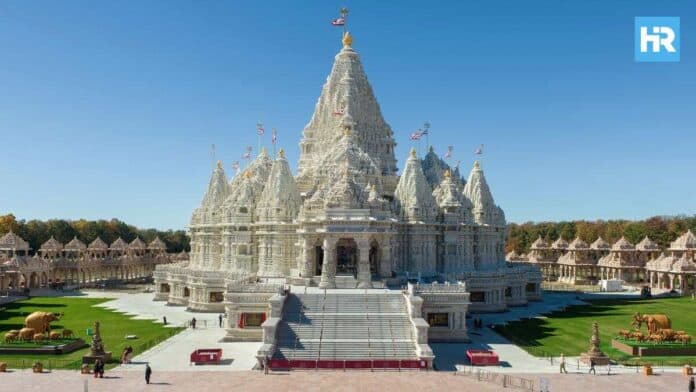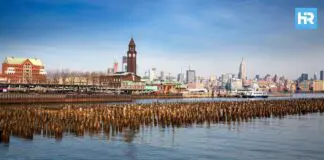The BAPS Swaminarayan Akshardham Temple in New Jersey is the largest Hindu temple complex in the United States, a remarkable spiritual and cultural landmark that reflects the grandeur of traditional Hindu architecture.
This awe-inspiring temple serves as a center for worship, education, and community activities, drawing visitors from across the globe. Still, this New Jersey temple has also been the subject of some controversy.
Want to find out more? Keep reading.
BAPS Swaminarayan Akshardham New Jersey Temple: Interesting Facts
- Opening Date: This Indian temple New Jersey was inaugurated on August 10, 2023
- Location: 112 N Main St, Robbinsville, NJ 08691
- Hours of Operation: Open daily from 9:00 AM to 7:30 PM, with extended hours during special events and festivals
- Architecture: Traditional Indian craftsmanship, featuring hand-carved stone and marble structures, intricate carvings, and stunning Hindu temple domes
- Facilities: The complex includes a main prayer hall, exhibition spaces, a cultural center, dining facilities, and beautifully landscaped gardens
- Events and Festivals: The temple celebrates major Hindu festivals such as Diwali, Janmashtami, and Navratri with great fervor, along with regular spiritual discourses and cultural programs
- Community Services: Offering various services including educational programs, health camps, yoga and meditation sessions, and youth activities
- Contact Information: You can contact the Indian temple at (609) 918-1212 or email [email protected]
- Website: Visit Akshardham.org for more information, event schedules, and visitor guidelines
New Jersey’s Hindu Temple & Its Importance
Located in Robbinsville, New Jersey, this temple stands out as a significant cultural and spiritual hub. Part of the global BAPS network, it is dedicated to Bhagwan Swaminarayan and has garnered attention since its opening on August 10, 2023.
It is the biggest Hindu temple in the USA, and there’s no such a temple campus anywhere near the size of it in NJ.
Globally, the largest temple complex is still the Angkor Wat in Krong Siem Reap, Cambodia, constructed in the 12th century and dedicated to the Hindu god Vishnu.
Unique Architectural Features
The New Jersey Indian temple’s design pays homage to traditional Indian architecture. Hand-carved from Italian Carrara marble, it features detailed carvings depicting stories from Hindu scriptures and various deities. The central dome is particularly notable for its intricate craftsmanship.
Construction Insights
The actual temple construction was a massive undertaking that involved over 4,000 volunteers from around the world.
The marble pieces were handcrafted in Rajasthan, India, and then shipped to New Jersey, where they were assembled on-site. This method ensured that traditional craftsmanship was preserved while maintaining precision in the construction of this Hindu Buddhist temple.
Role in the Community
Beyond its religious functions, the temple serves as a cornerstone for community activities such as health fairs, educational workshops, and social services.
It also aims to foster interfaith dialogue and understanding among different communities.
History of the Swaminarayan Akshardham Temple NJ
The project was driven by the Bochasanwasi Akshar Purushottam Swaminarayan Sanstha (BAPS), which was led by His Holiness Pramukh Swami Maharaj and later His Holiness Mahant Swami Maharaj.
Vision and Role of the New Jersey Hindu Temple
The vision for the temple emerged in the early 2000s, driven by the need for a dedicated space that would serve both religious and cultural purposes for the growing Hindu population in the Northeast United States.
Discussions began within the BAPS community about creating a temple that would not only be a place of worship but also a center for education, culture, and social activities.
Securing Land and Building Trust for the Stunning Hindu Temple
Securing the land in Robbinsville for BAPS Shri Swaminarayan Mandir was the first significant hurdle. The process required extensive negotiations with local authorities to obtain zoning approvals and address environmental concerns related to the large-scale project – in addition, it was the first Hindu temple in the state of this size.
Initial opposition from some local residents and regulatory challenges required the BAPS leadership to engage in community outreach and dialogue to gain support.
Craftsmanship in Building BAPS Shri Swaminarayan Mandir
The construction phase involved a global effort. Artisans, or shilpis, from Rajasthan, India, were brought in due to their expertise in traditional stone carving.
These artisans meticulously hand-carved over 13,500 pieces of Italian Carrara marble, which were then numbered, packed, and shipped to New Jersey. Assembling these pieces on-site required precise alignment and fitting, akin to completing an enormous, intricate puzzle.
Mastering Logistics for BAPS Swaminarayan
Transporting the marble pieces across continents was a logistical challenge in itself. Each piece had to be carefully packaged to avoid damage during transit.
The shipping containers were tracked meticulously, and the process of clearing customs introduced additional layers of coordination.
Once in New Jersey, assembling the temple according to both traditional methods and modern building codes required skilled labor and detailed planning.
Community-Driven Project for BAPS Swaminarayan
The project was not just a construction endeavor but a community-driven initiative. Over 4,000 volunteers from around the world contributed their time, skills, and financial resources. As of today, this temple hosts various events and always has fun things to do in New Jersey.
Controversies Surrounding the Temple
The Hindu Temple in New Jersey has been embroiled in several controversies, primarily centered around allegations of forced labor.
In May 2021, a federal lawsuit was filed accusing BAPS of exploiting over 200 workers from India. These workers were allegedly brought to the U.S. on R-1 religious visas and forced to work under grueling conditions for as little as $1.20 per hour.
The lawsuit claimed that the workers labored for up to 13 hours a day, six days a week, while their passports were confiscated, restricting their movement.
Local community concerns have been raised regarding the environmental impact of the large-scale construction. Residents have voiced worries about potential damage to wetlands and increased traffic congestion.
Testament to New Jersey’s Hindu Heritage
When all is said and done, the BAPS Swaminarayan Akshardham Temple still stands as a testament to cultural dedication and architectural grandeur and it is one of many examples of how diverse New Jersey really is.






